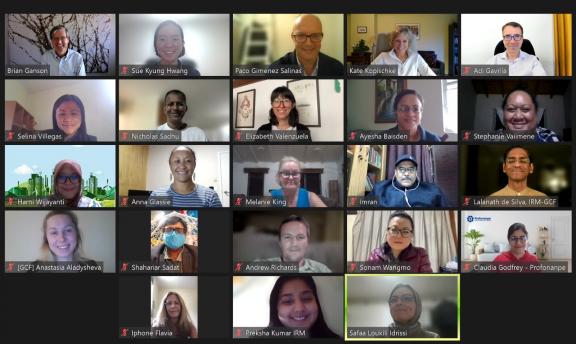IRM Community-Company Mediation Training: Building the capacity of GCF Direct Access Entities to handle complaints in complex contexts
Following a toxic mudslide by a local mining company, residents of Yuso Village in southern Equatania filed a complaint with the grievance mechanism of the Regional Development Bank (RDB). In their complaint, the residents alleged that the mining company, in which the RDB holds a 5% equity stake, had not complied with the bank’s performance standards. More specifically, they alleged violations of labour rights and health and safety safeguards and raised concerns regarding the mine’s impact on local water resources and the threat it represents for local biodiversity. The complainants demanded remedial actions be made and compensations be offered to affected families. The RDB’s grievance mechanism determined that there was apparent evidence that the allegations would constitute non-compliance to the bank’s policies. Based on this initial assessment, they declared the complaint eligible and opened an investigation process.
No need to search the internet if you have never heard of Equatania or the “Regional Development Bank”! It is not a memory gap; it is simply that neither exist. They are both fictional as is the case cited above. This fictional complaint case was developed by Professor Brian Ganson from Stellenbosch University and international mediator Kate Kopischke, two globally recognized leaders in the study of company-community mediation processes. It has served as the basis for a advanced mediation training the two experts have conducted for professionals around the world. The case, although fictional, is inspired by real life settings where complaints are informed by historical conflicts or tensions, unequal power dynamics, and lack of trust, making dialogue among parties extremely difficult.
Last year, as part of its capacity building mandate, the IRM created an animated video to bring the case to life and commissioned Prof. Ganson and Ms. Kopischke to offer a mediation training to staff of organizational grievance mechanisms of GCF’s Direct Access Entities. 14 regional and national Accredited Entities were invited, covering Latin America and the Caribbean, Africa, and Asia and the Pacific. A few mediators from the IRM’s roster of mediators also joined the training.

Through 4 intensive sessions, the participants were introduced to different strategies and tools mediators use to explore parties’ willingness to engage in dispute resolution, understand their ideas for resolving a complaint and design a mediation process in a complex setting. The Equatania case allowed for an immersive and intellectually challenging training. Along with the text of the complaint, the participants were given a background briefing presenting the history of the country and region and were assigned different roles. Each represented a different party to the complaint from the CEO of the mining company to the head of a women’s agricultural cooperative. Selective information was provided to the participants to reflect the challenges mediators face in handling unequal availability of information. Finally, role play exercises were held to prompt the participants to think empathetically about the barriers individual parties might deal with when engaging in a mediation process.
Although the time was limited, the training was able to promote a better understanding of the challenges and opportunities in conducting mediation in complex contexts. This knowledge will assist the participants in strategically managing the grievance cases filed with their respective mechanisms.
"The training provides a theoretical and practical lesson in a comprehensive way. Using a very complex case in Equatania really helped me to get the perspective of a mediator in a complex situation and gave me a new way of thinking when facing such cases. The training provides the fundamental tools which will help me to map the case in any project." - Harni Wijayanti, Environmental and Social Safeguards Officer at PT Sarana Multi Infrastruktur (Indonesia)
Training staff of grievance redress mechanisms on mediation techniques is essential considering that most of the cases submitted to grievance and accountability mechanisms are referred to problem-solving (or dispute resolution, depending on the terminology used). Through this process, a dialogue among parties to the complaint is facilitated to identify and agree on remedial actions which address the complainants’ concerns. Through this training, the IRM is building the capacity of grievance redress mechanisms in regional and national accredited entities of the Green Climate Fund, ensuring greater access to remedy for communities affected by GCF-funded projects. The IRM will hold a new edition of this training in 2022 to offer the opportunity to join those who were not able to attend in 2021.